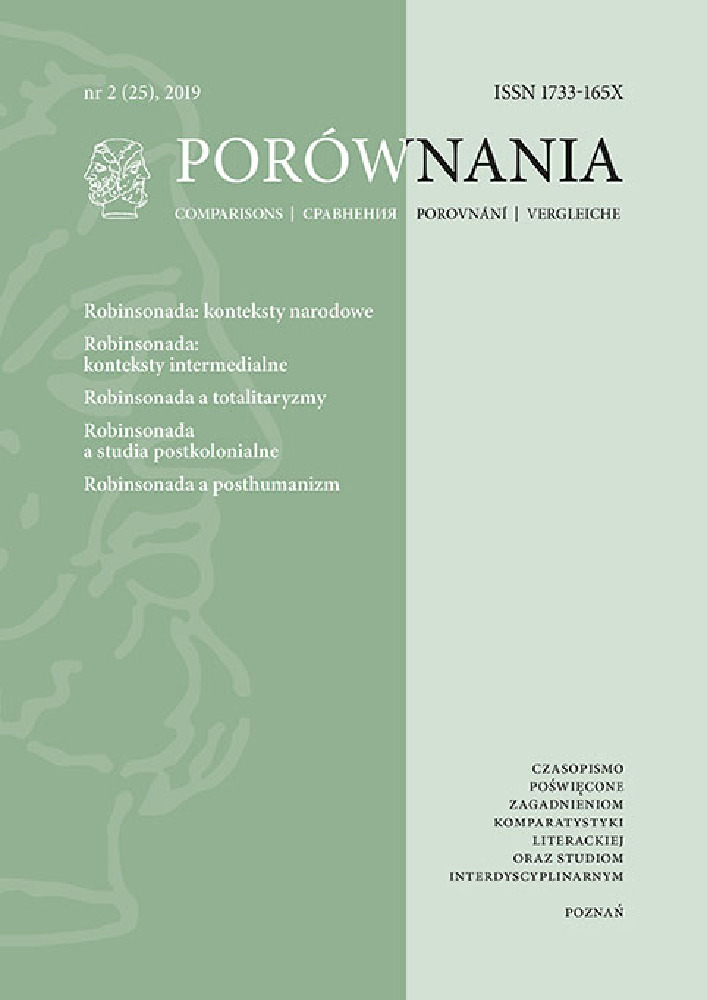Abstrakt
W artykule podjęto próbę przeglądu wybranych wątków recepcyjnych powieści Daniela Defoe Przypadki Robinsona Crusoe (1719) wobec Zagłady. Ukazanom tym samym, jakie elementy powieści aktualizują się w kontekście Szoa, jakie się zacierają oraz co nowego o losie innych książek i ludzi z XX wieku pozwala powiedzieć ów trzystuletni utwór. Angielska powieść służy w omówionych tekstach jako synekdocha (Primo Levi, Uri Orlev), lektura apotropaiczna (świadectwa osobiste, m. in. wspomnienia Hanke Grynberg) lub podstawa dla wykreowania apokryfu (wiersze Dana Pagisa i Jehudy Amichaja).
Bibliografia
Abramowska, Janina. „Topos i niektóre miejsca wspólne badań literackich”. Pamiętnik Literacki 1/2 (1982). S. 3-23.
Amichai, Yehuda. The Poetry of Jehuda Amichai. Red. R. Alter. Nowy Jork: Farar, Straus and Giroux, 2015.
Amichaj, Jehuda. Koniec sezonu pomarańczy. Wybór wierszy. Przeł. Tomasz Korzeniowski. Izabelin: Świat Literacki, 2000.
Amichai, Yehuda. Open Closed Open. New York: Mariner Books, 2000.
Andruszko, Ewa. „Modyfikacje toposu wyspy Robinsona: Defoe, Giraudoux, Tournier”. Archipelagi wyobraźni: z dziejów toposu wyspy w kręgu literatur romańskich. Red. E. Łukaszyk. Kraków: Wydawnictwo Uniwersytetu Jagiellońskiego, 2007. S. 137-155.
Bauer, Yehuda. Przemyśleć Zagładę. Przeł. Jerzy Giebułtowski, Janusz Surewicz. Warszawa: Żydowski Instytut Historyczny, 2016.
Berger, Ronald J. Surviving the Holocaust. A Life Course Perspective. Abingdon: Routledge, 2011.
Bodenheimer, Alfred. “Kein Midrasch nach Auschwitz: Dan Pagis’ Gedicht: mit Bleistift im versiegelten Waggon geschrieben”. Ein Bruch der Wirklichkeit: die Realität der Moderne zwischen Säkularisierung und Entsäkularisierung. Red. J. Mattern. Berlin: Vorwerk 8, 2002. S. 210-219.
Camus, Albert. Dżuma. Przeł. Joanna Guze. Warszawa: Państwowy Instytut Wydawniczy, 2009.
Celan, Paul. „List do Jehudy Amichaja”. Przeł. Daniel Tomczak, Joanna Roszak. Odra 6 (2011). S. 37.
Cobel-Tokarska, Marta. Bezludna wyspa, nora, grób. Wojenne kryjówki Żydów w okupowanej Polsce. Warszawa: IPN, 2012.
Defoe, Daniel. Przypadki Robinsona Kruzoe. Przeł. Józef Birkenmajer. Warszawa: Książka i Wiedza, 1974.
Duffy, Helena. „La bienveillance de la critique polonaise”. Writing the Holocaust Today: Critical Perspectives on Jonathan Littell’s „The Kindly Ones”. Red. A. Barjonet, L. Razinsky. Amsterdam: Rodopi, 2012. S. 239-261.
Dunin-Wąsowicz, Krzysztof. Na Żoliborzu 1939–1945. Warszawa: Książka i Wiedza, 1984.
Ein Mann der Wahrheit. Zum Tode des israelischen Dichters Jehuda Amichai. Web. 30.08.2019 <http://www.hagalil.com/archiv/2000/09/amichai.htm>
Garrett, Leah. „The Jewish Robinson Crusoe”. Comparative Literature 3 (2002). S. 215-228.
Hanka Grynberg. Web. 9.09.2019. <https://dzieciholocaustu.org.pl/szab3.php?s=en_myionas_08.php>
Hecht, Anthony. „Sentenced to Reality”. The New York Review of Books 2 November (2000). Web. 30.08.2019 <https://www.nybooks.com/articles/2000/11/02/sentenced-to-reality/>
Janczewska, Marta. „Codzienność i niecodzienność Zagłady”. Literatura polska wobec Zagłady (1939-1968). Red. S. Buryła, D. Krawczyńska, J. Leociak. Warszawa: Fundacja Akademia Humanistyczna, Instytut Badań Literackich PAN, 2012. S. 82-139.
Kertzer, Adrienne. My Mother’s Voice: Children, Literature, and Holocaust. Calgary: Broadview Press, 2001.
Kosior, Wojciech. „Apotropaiony w midraszu do Księgi Jonasza według Pirke De-Rabbi Eliezer. Wstęp, przekład, komentarz”. Zwyczaje i akcesoria apotropaiczne w cywilizacjach świata. Red. K. Kleczewska, W. Kosior, A. Kuchta, I. Łatas. Kraków: AT Wydawnictwo, 2008. S. 31-47.
Lang, Berel. Holocaust Representation: Art Within the Limits of History and Ethics. Baltimore and London: The John Hopkins University Press, 2000.
Lau, Jörg. Młodzi Żydzi patrzą w przyszłość. Web. 30.08.2019 <https://voxeurop.eu/pl/content/article/186411-mlodzi-zydzi-patrza-w-przyszlosc>
Leo, Christian. Zwischen Erinnern und Vergessen. Jehuda Amichais Roman „Nicht von jetzt, nicht von hier” im philosophischen und literarischen Kontext. Würzburg: Verlag-Koenigshausen-Neumann, 2004.
Levi, Primo. Czy to jest człowiek. Przeł. Halszka Wiśniowska. Warszawa: Książka i Wiedza, 1996.
Littell, Jonathan. Łaskawe. Przeł. Magdalena Kamińska-Maurugeon. Kraków: Wydawnictwo Literackie, 2008.
McCullough, Shellie Gordon. Engaging the Shoah through the Poetry of Dan Pagis: Memory and Metaphor. New York i in.: Lexington Books, 2016.
Nasalska, Anna. „Posłowie”. Orlev, Uri. Książki mojego dzieciństwa (1931-1945). Przeł. Jan Rybicki. Lublin: Wydawnictwo Uniwersytetu Marii Curie Skłodowskiej, 2012.
Orlev, Uri. Książki mojego dzieciństwa (1931-1945). Przeł. Jan Rybicki, posłowie A. Nasalska. Lublin: Wydawnictwo Uniwersytetu Marii Curie Skłodowskiej, 2012.
Orlev, Uri. Wyspa na ulicy Ptasiej. Przeł. Ludwik Jerzy Kern. Poznań: Media Rodzina, 2010.
Pagis, Ada. „Mój mąż Dan”. Pagis, Dan. Ostatni. Warszawa: Wydawnictwo Studio EMKA, 2004. S. 7-11.
Pagis, Dan. The Selected Poetry. Przeł. Stephen Mitchell. Berkeley: University of California Press, 1996.
Pirro, Robert. Motherhood, Fatherland, and Primo Levi: The Hidden Groundwork of Agency in His Auschwitz Writing. Madison, Teaneck: Fairleigh Dickinson University Press, 2017.
Robinson, Ken. Oblicza umysłu. Ucząc się kreatywności. Przeł. Martyna Mentel. Gliwice: Element, 2016.
Rosenfeld, Alvin. A Double Dying: Reflections on Holocaust Literature. Bloomington and Indianapolis: Indiana University Press, 1980.
Rottenbach Bruno, red. Zwischen Würzburg und Jerusalem, in deutsches Dichterschicksal; Biographie und Werkauswahl. Würzburg: Echter, 1981.
Ruszała, Jadwiga. Robinsonada w literaturze polskiej: teoria, typologia, bohater, natura. Słupsk: Pomorska Akademia Pedagogiczna, Słupsk, 2000.
Gold, Nili Scharf. Amichai Yehuda. The Making of Israel’s National Poet. Hanover– Waltham: Brandeis University Press, 2008.
Sokołowska, Katarzyna. „Metafora i etyka w narracjach o Holokauście. Literackość odzyskana”. Śląskie Studia Polonistyczne 1 (2011). S. 121-130.
Szlengel, Władysław. Rzeczy. Web. 9.09.2019 <https://wolnelektury.pl/katalog/lektura/szlengel-rzeczy.html#footnote-idm140590862703792>
Webber, Mark J. „Metaphorizing the Holocaust: The Ethics of Comparison”. Images VIII (2011). S. 5-30.
Zangwill, Israel. Children of the Ghetto: A Study of a Peculiar People. Detroit: Wayne State University Press, 1998.
Żabińska, Antonina. Ludzie i zwierzęta. Kraków: Wydawnictwo Literackie, 2010.
Licencja
Utwory opublikowane w czasopiśmie „Porównania”, na platformie Pressto należącej do Uniwersytetu im. Adama Mickiewicza w Poznaniu są udostępniane na licencji Creative Commons Uznanie autorstwa - Bez utworów zależnych 4.0 Międzynarodowe (CC BY-ND 4.0)
Tym samym wszyscy zainteresowani są uprawnieni do korzystania z utworów opublikowanych pod następującymi warunkami:
-
uznania autorstwa — czyli obowiązek podania wraz z rozpowszechnianym utworem informacji o autorstwie, tytule, źródle (odnośniki do oryginalnego utworu, doi) oraz samej licencji
-
bez utworów zależnych — remiksując, przetwarzając lub tworząc na podstawie utworu, nie wolno rozpowszechniać zmodyfikowanych treści.
-
brak dodatkowych ograniczeń — nie można korzystać ze środków prawnych lub technologicznych, które ograniczają innych w korzystaniu z utworu na warunkach określonych w licencji.
Uniwersytet im. Adama Mickiewicza w Poznaniu zachowuje prawo do czasopisma jako całości (układ, forma graficzna, tytuł, projekt okładki, logo itp.).
Autor zachowuje prawa majątkowe, ale udziela zgody Uniwersytetowi im. Adama Mickiewicza w Poznaniu na wykorzystanie dzieła. Autorzy tekstów zakwalifikowanych do publikacji proszeni są o wypełnienie podpisanie i przesłanie umowa (PL) agreement (EN)
Agreement for granting a royalty-free license to works with a commitment to grant a CC sub-license




